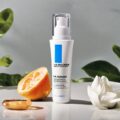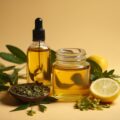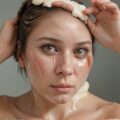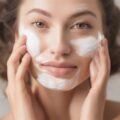Understanding Acne-Prone Skin and Moisturizing
Dealing with acne-prone skin can be a challenging journey, but it’s important to remember that you’re not alone. Millions of people around the world experience acne, and it’s nothing to be ashamed of. While it may feel counterintuitive, moisturizing is actually a crucial step in caring for acne-prone skin. The key is finding the right moisturizer that nurtures your skin without exacerbating breakouts.
Acne-prone skin often becomes irritated and dry, especially when using acne treatments. A good moisturizer can help balance your skin, reduce inflammation, and support the skin’s natural healing processes. Let’s explore how to choose and use moisturizers effectively for acne-prone skin, with a focus on gentle, nurturing care.
Key Ingredients to Look for in Moisturizers for Acne-Prone Skin
When selecting a moisturizer for acne-prone skin, it’s important to look for ingredients that hydrate without clogging pores. Some beneficial ingredients include:
- Hyaluronic Acid: This miracle molecule can hold up to 1000 times its weight in water, providing intense hydration without heaviness.
- Niacinamide: Also known as Vitamin B3, niacinamide can help reduce inflammation and redness associated with acne.
- Ceramides: These lipids help strengthen the skin barrier, which can be compromised in acne-prone skin.
- Salicylic Acid: In small amounts, this can help gently exfoliate and unclog pores while moisturizing.
- Aloe Vera: Known for its soothing properties, aloe can calm irritated skin and provide light hydration.
Remember, everyone’s skin is unique. What works for one person may not work for another, so it may take some gentle experimentation to find your perfect match.
Tips for Applying Moisturizer to Acne-Prone Skin
Applying moisturizer to acne-prone skin requires a delicate touch. Here are some tips to help you get the most out of your moisturizer:
- Cleanse gently: Start with a mild, non-comedogenic cleanser to remove dirt and excess oil without stripping your skin.
- Apply to damp skin: Moisturizer is most effective when applied to slightly damp skin, as this helps lock in hydration.
- Use light, upward strokes: Be gentle with your skin. Avoid rubbing or pulling, which can irritate acne-prone skin.
- Don’t overdo it: A pea-sized amount is usually sufficient for the entire face. Using too much product can lead to clogged pores.
- Be consistent: Moisturize morning and night as part of your regular skincare routine.
Remember, treating your skin with kindness and patience is key. Healing takes time, and being gentle with yourself is just as important as being gentle with your skin.
The Importance of Sun Protection for Acne-Prone Skin
While focusing on moisturizing, it’s crucial not to overlook sun protection. Many people with acne-prone skin shy away from sunscreen, fearing it will cause breakouts. However, sun exposure can actually worsen acne and lead to hyperpigmentation, especially in healing blemishes.
Look for a lightweight, non-comedogenic moisturizer with SPF 30 or higher for daytime use. If you prefer to use a separate sunscreen, apply it after your moisturizer. Remember, protecting your skin from the sun is an act of self-care that your future self will thank you for.
Lifestyle Factors That Complement Moisturizing for Acne-Prone Skin
While a good moisturizer is important, remember that skin health is influenced by many factors. Here are some holistic approaches to support your skin:
- Stay hydrated: Drinking plenty of water helps keep your skin hydrated from the inside out.
- Eat a balanced diet: Focus on fruits, vegetables, whole grains, and lean proteins. Some people find that reducing dairy and sugar intake helps their skin.
- Manage stress: High stress levels can exacerbate acne. Practice stress-reduction techniques like meditation, yoga, or deep breathing exercises.
- Get enough sleep: Your skin repairs itself while you sleep, so aim for 7-9 hours per night.
- Be mindful of what touches your face: Regularly clean your phone, pillowcases, and anything else that frequently comes into contact with your skin.
Remember, caring for acne-prone skin is a journey, not a destination. Be patient with yourself and celebrate small improvements along the way.
Frequently Asked Questions About Moisturizer for Acne-Prone Skin
1. Can moisturizer make acne worse?
Not if you choose the right one. Look for non-comedogenic, oil-free moisturizers specifically formulated for acne-prone skin. These are designed to hydrate without clogging pores.
2. How often should I moisturize if I have acne-prone skin?
Generally, it’s best to moisturize twice a day – once in the morning and once at night. However, if your skin feels dry during the day, it’s okay to apply a light layer of moisturizer as needed.
3. Is it okay to use moisturizer if I’m using acne treatments?
Absolutely! In fact, it’s especially important to moisturize when using acne treatments, as many can be drying. Just be sure to allow any treatment products to absorb fully before applying your moisturizer.
4. Can natural oils be used as moisturizers for acne-prone skin?
Some natural oils, like jojoba or rosehip oil, can be beneficial for acne-prone skin. However, it’s important to patch test first and introduce them slowly, as some people may find oils too heavy for their skin.
5. How long does it take to see results from a new moisturizer?
It typically takes about 4-6 weeks for your skin to adjust to a new product. Be patient and consistent with your routine. If you experience persistent irritation, discontinue use and consult a dermatologist.
Remember, everyone’s skin is unique, and what works for one person may not work for another. Be patient with your skin, and don’t hesitate to seek professional advice if you’re struggling. You deserve to feel comfortable and confident in your skin, and with the right care and compassion, you can achieve that.









